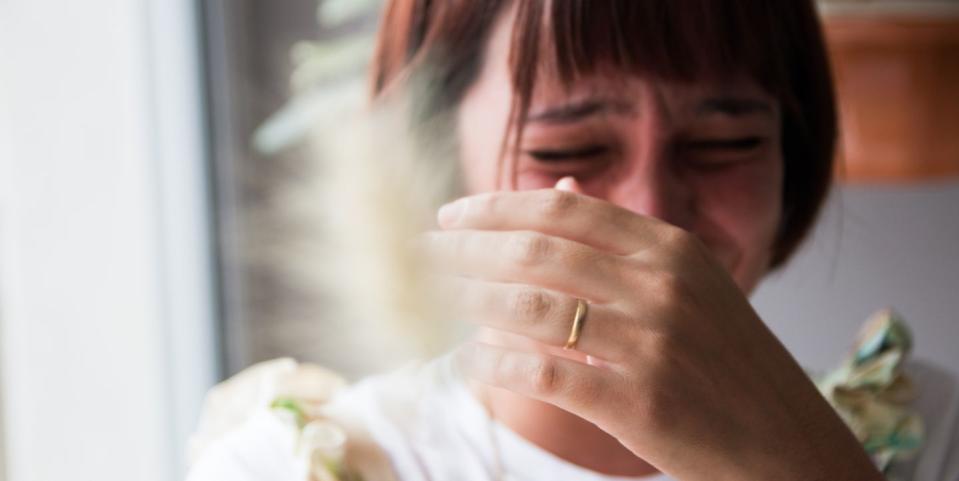I Cry in Front of My Kid — And I Don't Worry About Hiding My Tears Anymore

It was mid-March, and my two young kids were screaming for a dinner that was far from ready. Before I could take a deep breath, tag my husband for a break or escape to the bathroom, I felt my chest tighten, my cheeks flush and the tears begin to flow. Being confined to an 800-square-foot apartment had frayed everyone’s nerves, and though I don’t normally cry in front of my kids, this time the emotion got the better of me.
Later, once the kids were in bed and I had time to reflect on the stressful day, I wondered, Was it bad to cry in front of my kids? Was my open display of emotion damaging to them?
Thankfully, the answer to those questions is no, says Beth Proudfoot, LMFT, a parent educator in San Jose, CA, who has more than 35 years’ experience counseling children and families. “It’s true that parents should provide the support structure for their children,” she says. “But adults have emotions too. There’s no need to hide them.”
Plus, 2020 qualifies for many as one of the most emotionally difficult years in recent memory. In this COVID-19 era, caregivers, especially moms, have been pulled in all directions — working from home, caring for children, managing online learning systems and continuing day-to-day chores on top of cooking. Some also have endured bigger hardships such as the loss of a loved one, poor health or financial worries.
Of course, there are other reasons to cry that aren’t related to sadness or frustration. A few months ago, I pictured my second child as a newborn, and … waterworks! And is it just me or does watching Hallmark movies require far more tissues than it used to?
Brad Repke, a senior wealth adviser in Michigan, hasn’t always cried openly in front of his children. In fact, he used to suppress and ignore his emotions. But therapy and the experience of fatherhood allowed him to tap into a deeper, more sensitive part of himself. Now discussing emotional topics is just as important as playing games and fishing with his kids and discussing manners, respect and hard work. He tells them, “If you need to shed some tears, that’s OK.” And Brad encourages his son in particular to express his feelings in a way Brad himself hasn’t always felt comfortable doing. “I want him to understand that crying is perfectly fine and can actually make you feel better,” Brad says. He’s right: Crying is helpful. It releases oxytocin and endorphins, feel-good chemicals that can help ease both physical and emotional pain.

The experts to whom I spoke stressed that the more kids see adults in their lives crying and bouncing back, the less stigmatized tears become. Here are a few more guidelines I learned.
Tell kids it's not their fault when you cry.
Children, especially younger ones, are essentially egocentric. They will think that they’ve made you sad if they see you cry — unless you explain the real cause. Proudfoot recommends statements like, “I’m crying now because I am sad that Fluffy died. But I’m going to be fine, and I’ll call my friend later to talk about it.”
Isabel Bascón, who works with young kids at a nursery school in Madrid, has similar advice. “Keep it simple with a statement kids can easily understand,” she says. “Like ‘I miss my friend’ or ‘It didn’t turn out the way I wanted.’”
Explain your feelings.
Let your kids know you’re crying because you’re sad, happy, angry, frustrated or touched. The sooner they’re able to identify the nuances of their own emotions, the better. “The goal as parents should be to model for kids the appropriate expression of emotion,” says Proudfoot. That means not hiding your tears, but also not subjecting kids to extreme anger or sadness.
Find comfort elsewhere.
It’s all right if your kids give you a hug when you’re crying — it shows that they’re empathetic. But “some parents get into trouble by always expecting their children to comfort them,” Proudfoot says. Rather than demonstrating the natural inclination to comfort a loved one in a moment of emotion, a child may begin to bear the burden of making the parent feel better. “This kind of role reversal isn’t OK,” she says. “Parents comfort children, not the other way around.”
Smile through your tears.
If they do offer comfort, thank your child with a big grin and let them know that you are OK and have other adults around to support you.
Last week, after a stressful day, I felt that familiar sensation in my chest and cheeks. The tears came, and this time, instead of fighting the feeling, I greeted it with humor. “I know, here come the waterworks again!” I told my kids. “No worries — turning off the faucet now!”
You Might Also Like

